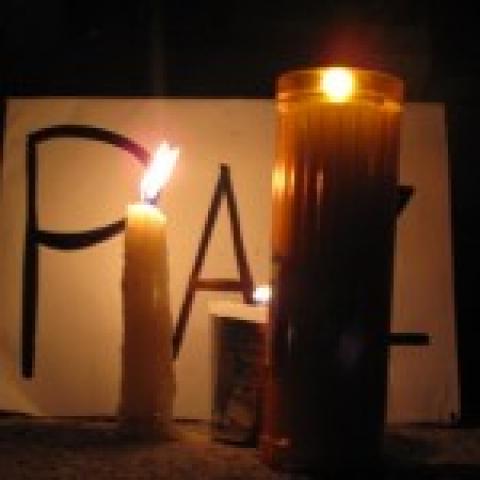
In today´s Gospel, John the Baptist announces to the people gathered at the Jordan River that Jesus is the long-awaited Messiah. Even though Jesus was right there in front of them, the people needed help to recognize him … and even so, many chose not to believe.
We still have difficulty seeing Jesus, especially within people who are of a different religion, race or socio-economic group than we are. We can let our prejudices and fears blind us to the light of Christ emanating from others.
Once a week, I go to a maximum security prison to participate in a Bible study for a group of Latino men, most of whom are originally from countries other than the U.S. The men share how the following week’s Gospel speaks to them as prisoners. I am humbled by their faith and how they recognize Christ is present, even within the prison walls. However, when I tell people that I volunteer at the prison, they ask me if prisoners can truly reflect on Scripture or are interested in living their faith! I assure them that these men are just like everyone else and have much to teach me.
While serving as a Maryknoll lay missioner in Tanzania, I taught at a Catholic university that had a small minority of Muslim students. Even though I knew little about Islam, some of the Muslim students would give me cards wishing me a Happy Eid. I appreciated their including me in their holidays. Since the attacks on September 11, 2001, many people view Muslims as terrorists. Recently, when someone asked me if I knew anything about Muslims, I told him that they were just like anyone else and explained that more Muslims than Christians have been killed by terrorists. Personally knowing people of other faiths can eliminate stereotypes and bring greater understanding. We are all brothers and sisters because we are created by God.
Currently, I belong to a parish that is two-thirds Latino. This parish started out serving the needs of Italian and Portuguese immigrants. Now, it welcomes thousands of new immigrants from Central and South America. The Latino members of the community have enlivened the parish with traditions from their home countries. I enjoy attending one of the Spanish Masses because there is always some sort of celebration or ethnic foods available!
Many of the parishioners are undocumented. After spending eight years as a missioner in El Salvador, I now have more knowledge of the reasons for people to risk their lives and leave everything familiar to search for a better life in other countries. Unfortunately, as undocumented people, they can be exploited or live in fear of deportation. Our parish offers many services to these immigrants, including legal services to help them receive wages they have earned but have been denied by employers.
When we allow prejudice or hatred into our hearts, we conceal the light of Christ within us and because of our own blindness, cannot see the light of Christ within others. In the Buddhist tradition, people greet each other with the word “Namaste,” which signifies greeting the divine in the other person.
The first reading tells us we are called by God to be a “light to the nations.” We can only do this by seeing the divine in each person we encounter. In this way, we will live our faith and transform the world.
Each of us needs to let our light of faith shine in the world so that those in darkness and fear can find a beacon of hope and comfort. So as the spiritual song goes, “This little light of mine, I’m gonna let it shine …”
